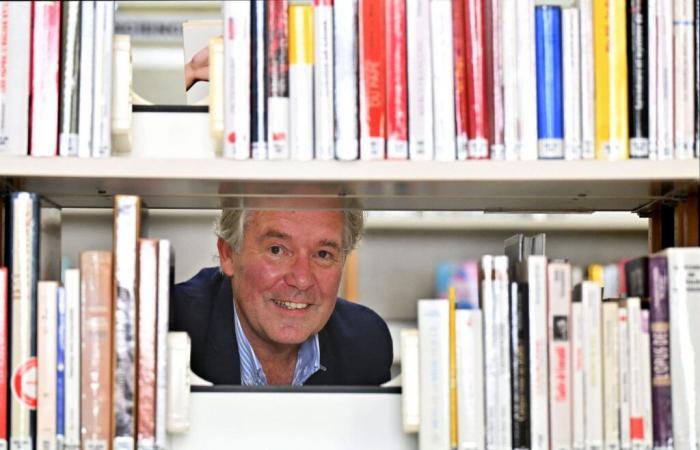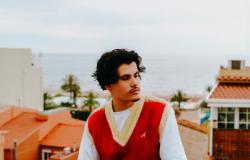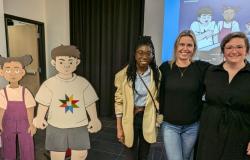The Cross : Jérôme Garcin, you are the president of the 42e Brive-la-Gaillarde Book Fair. What does this inspire you?
Jérôme Garcin: This proposal had already been made to me a few years ago, but I had to refuse due to lack of time. Having handed over the reins of “Mask and the Feather” this year, I accepted this time. I have very good memories of the fair. I had come to record a show on “Masque” and also an issue of the television show “La Boîte à lettres”, which I hosted a long time ago. I like this event, which is both very popular and very cultural, which is what I tried to do on the radio. I like the idea of all the books being present, literature, current affairs, poetry, comics…
The fair has established itself as an unmissable event… How to explain it?
J. G. : It’s a ritual: the fair brings together those who participated in the literary season, brings them into dialogue with each other and with the public. It’s an incredibly multifaceted and festive moment. As president, I add a personal touch and a few guests. I cannot name them all, but there will be the photos of Hanna Assouline, who will present in different places in the city around fifty black and white diptychs of the writers whose faces and hands she has taken, a work started thirty years ago. I will ask her if she cannot add one or two authors, Kamel Daoud, winner of the 2024 Goncourt Prize, for example.
I invited Olivia Gesbert, who directs At NRF and published this fall an issue devoted to resistance under the title “So it’s no! ». Eighty years after the city of Brive liberated itself, it is a tribute to the resistance. And then I don’t forget my passion for theater and cinema: there will be a beautiful exchange between Marthe Keller and Rachida Brakni. Finally, I will mention the books of my fellow broadcasters which I could not talk about during “The Mask” due to ethics: I will have with me Frédéric Beigbeder, Sophie Avon, Olivia de Lamberterie, Éric Neuhoff…
You are talking about “Masque et la plume”, a Sunday show that you hosted for thirty-five years, until June 2024. Do you miss it?
J. G. : First of all, I continue my notepad to L’Obs : I have always loved books, cinema, theater, and I couldn’t do without them. On the other hand, I had no problem going without a microphone. If I’m being completely honest, what I miss is the adrenaline of recording sessions. It was during this collective moment that the common passion for culture, all backgrounds and all generations combined, crystallized. It was a heavy load, 52 Sundays a year, doing everything alone… I dedicated my life to “The Mask”. I had to read everything, see everything…
During the show, I had to be strong, every week, whatever happened elsewhere in my private life. After the publication of My fragile (1), I felt that I also had to think about my own weaknesses. I am happy to have passed the torch to Rebecca Manzoni. Of course, I realized that it was my voice that an entire generation was listening to, but this show is not mine. It was created in 1956, there was Michel Polac, François-Régis Bastide, Pierre Bouteiller before me.
This fall, you are publishing a book on writers and collaboration during the Second World War (2). Isn’t this a painful subject?
J. G. : This is the book of a reader rather than a historian. For years, I have had a passion, albeit a little murky, for everything that was written during the dark years, diaries, correspondence, novels… It was Régis Debray who suggested that I publish something in his collection ” The part of others.” As I accumulated my reading notes, I realized how much it hurt, yes. There are people in this country, in this literary environment, who have behaved ignominiously.
Thirty years ago, I wrote my first book For Jean Prévost (3), in homage to this resistance writer who died in the Vercors. Pages of heroism are rare in French letters of the time. This does not detract from the genius of Céline or the literary talent of others, but I cannot stand the fact that today we can boast of the worst anti-Semitic literature. I know I’m going against a certain misconception that “we don’t make literature with good feelings.” For my part, I am happy to have introduced Jacques Lusseyran, resistant writer, blind since childhood and author of And the light was (4) and also The world begins today (5).
Of The Fall of a Horse (6), which evokes the death of your father, My fragile (1) which recounts recent bereavements, your family is at the heart of your literary work. How to understand it?
J. G. : Writing involves an element of immodesty, but I believe that is what we all have in common: we are what events have made us. It’s true, I am marked by early drama. The refusal of oblivion is the link of all these books, pulling from oblivion my father who died at 45 years old, my twin taken away at 6 years old before my eyes, these young deaths like my father-in-law Gérard Philipe (36 years old) , the resistance fighter Jean Prévost (43 years old)…
“The dead have only the living as resources”, said Paul Valéry during his installation speech at the French Academy (1927). I don’t believe in the cliché of writing as therapy, but more profoundly, writing allows you to gather around you those you have loved and to make them live again.
(1) My fragileGallimard, 112 p., 14 €.
(2) Words and actions. Belles lettres under the OccupationGallimard, 176 p., 18,50 €.
(3) Gallimard, Prix Médicis 1994, 208 p., €7.40.
(4) The Round Table, 1953.
(5) The Round Table, 1959.






